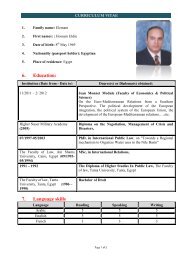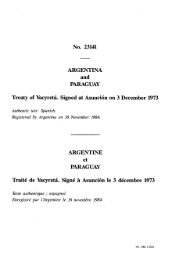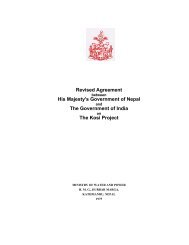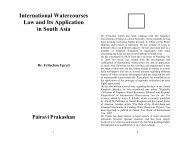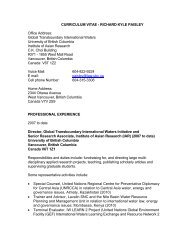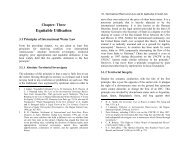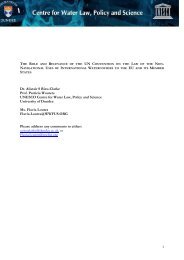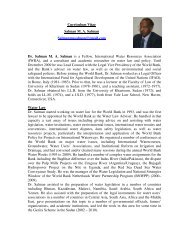Upreti, Trilochan, International Watercourses Law and Its Application ...
Upreti, Trilochan, International Watercourses Law and Its Application ...
Upreti, Trilochan, International Watercourses Law and Its Application ...
You also want an ePaper? Increase the reach of your titles
YUMPU automatically turns print PDFs into web optimized ePapers that Google loves.
Equitable Utilisation / 165 166 / <strong>International</strong> <strong>Watercourses</strong> <strong>Law</strong> <strong>and</strong> <strong>Its</strong> <strong>Application</strong> in South AsiaArticle 3 states in the case of damage referred to in theforegoing Article, an agreement of the parties shall always benecessary. In the case of any injury, the states concerned mustinvolve themselves in negotiation <strong>and</strong> seek out a satisfactoryresolution of the dispute by paying reparation for the injury. Forinstance, India paid compensation to Pakistan when Pakistan’sirrigation network was disrupted by partition <strong>and</strong> theconstruction of an irrigation network was required inPakistan. 197In the 1872 Helmond case, such rights <strong>and</strong> obligations wereprovided to both states. 198 Nonetheless, Iran challenged thedecision <strong>and</strong> it has not been applied yet. In the inter-statedispute between Aargau <strong>and</strong> Zurich, the Federal Court ofSwitzerl<strong>and</strong> in its decision of 1878, upheld the principle ofequality of right for both states over their commonwatercourse. 199The German Federal Court, in the case of Wittenberg <strong>and</strong>Prussia v. Baden in 1927, decided that a state is under "the dutynot to injure the interest of other states". 200 The disputes wereresolved later by mutual agreement. In 1913, the AustrianCourt, the Imperial Royal Administrative Court, in the Leitha197 Ibid. p. 231.; also see supra note 63, p 208-The Indian contributionwas fixed at US$ 174 million, <strong>and</strong> around US$ 800 million wasallocated by western governments for the Indus Development Fund.198 Ibid. p. 235-36; also see II YBILC (1974), pp. 233-234.199 Schindler, "The Administration of Justice in the Swiss Federal Court in<strong>International</strong> Disputes" (1921) in AJIL, pp. 169-172: A license to builda hydro-electric plant on the Jonalach River was given under Zurichlaw, on the consideration that a certain sum of money deposited in abank be used to indemnify persons whose existing uses downstreammight be injured by the new works. The work diminished the flow todownstream Aargau which led to Aargau complaining to the FederalCourt to declare the former concession invalid. The court called uponthe parties to utilise waters as such way that did not create any harm orcut the entitlement of other cantons.200 Annual Digest of Public <strong>International</strong> <strong>Law</strong> Cases, (1927) p. 128.River Case, however, rejected the Hungarian citizens’ claimthat diversion of the Leitha waters inside Austria was aviolation of customary international law. 201 The concept of notcausing injury or any harm to the other basin states was alsoaffirmed in the Franco-Italian dispute over the use of the RojaRiver water. 202In a recent case concerning the construction <strong>and</strong>implementation of the Gavcikovo-Nagymaros dam, the ICJ heldthe view that the operation of Variant C by Slovakia, tomitigate the harm caused by non-implementation of the Treatyby Hungary, where 80% of the waters were diverted, ignoringHungary's legitimate interest in it, was illegal. 203 Thus, for itsillegal work Slovakia was required to pay compensation toHungary for having adversely affected Hungary’s reasonable<strong>and</strong> equitable entitlement over the beneficial use of thosewaters. In the Corfu Channel case, the ICJ adjudged thatrespect for territorial sovereignty is an essential cornerstone ofinternational relations. Albania was held responsible for thedamages incurred by the British vessels <strong>and</strong> crew, <strong>and</strong> it wasrequired to give notification of the mines lying beneath thesurface of the sea, where the accident had happened. 204In the context of state practice, a co-riparian state has a right toutilise the waters within its territory on the condition that such201 Annual Digest of Public <strong>International</strong> <strong>Law</strong> Cases, (1940) pp. 594-595.202 Annual Digest of Public <strong>International</strong> <strong>Law</strong> Cases, (1938-1940) p. 120.203 37 ILM (1998), pp. 168-239.204 ICJ Decision on Corfu Channel case, (1949), ICJ Reports, p. 4, "thecourt draws the conclusion that the laying mines of the minefield couldnot have been accomplished without the knowledge of Albania. Asregard the obligations resulting for her from this knowledge, they arenot disputed. It was her duty to notify shipping <strong>and</strong> especially to warnthe ship proceeding through the strait on October 22, of the danger towhich they were exposed. In fact, nothing was attempted by Albania toprevent the disaster, <strong>and</strong> these grave omissions involve herinternational responsibility”.



